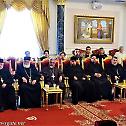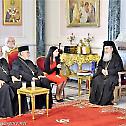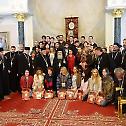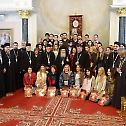Culture
Music event by Saint James Choir and Branko Serbian Choir
9. December 2016 - 9:43On the afternoon of the 14th/27th of November 2016, a music event performed by the Choir of St James the Brother of God Cathedral and “Branko” Choir of the Patriarchate of Serbia took place in the auditorium of Notre Dame Hotel, near the New Gate. The event was hosted by the Patriarchate of Jerusalem.
No Faith is More Beautiful than the Christian Faith
11. November 2016 - 16:41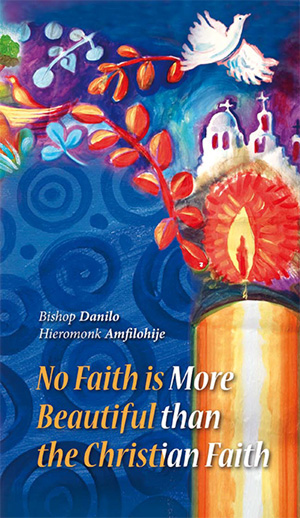 From the pen of Bishop Danilo (Krstić) and Hieromonk Amfilohije (Radović), originally published in Serbian (in 1996) and now available in English for the first time, this Catechism book is a great introduction into the basic evangelical teachings of the Orthodox faith and life. Authors of this publication are offering this simple but existential gift to all. This wonderful book belongs to Christian Orthodox Catechism series and explores the mystery of faith in Old and New Testament. Among many other questions it answers these existential inquiries: What is true faith? Who is God? What is God like? Who is man? What is God’s revelation? What is the Bible, or the Holy Scriptures? What is the Old Testament? What is the Tree of the Knowledge of Good and Evil? Why is the Lord Jesus Christ called the God-Man? What did Jesus say on Saturday, the Sabbath? How does the history of the Church begin? It concludes with the chapter on the prayer life of the Church and the last days.
From the pen of Bishop Danilo (Krstić) and Hieromonk Amfilohije (Radović), originally published in Serbian (in 1996) and now available in English for the first time, this Catechism book is a great introduction into the basic evangelical teachings of the Orthodox faith and life. Authors of this publication are offering this simple but existential gift to all. This wonderful book belongs to Christian Orthodox Catechism series and explores the mystery of faith in Old and New Testament. Among many other questions it answers these existential inquiries: What is true faith? Who is God? What is God like? Who is man? What is God’s revelation? What is the Bible, or the Holy Scriptures? What is the Old Testament? What is the Tree of the Knowledge of Good and Evil? Why is the Lord Jesus Christ called the God-Man? What did Jesus say on Saturday, the Sabbath? How does the history of the Church begin? It concludes with the chapter on the prayer life of the Church and the last days.
Thy Will Be Done: Strategic Leadership, Planning, and Management for Christians
9. November 2016 - 11:18It was good to meet you again in Detroit last week. Congratulations again on your enthronement.
Your Grace: As you know, I distributed a flyer at the Assembly for my new book. I would like to give you more background on why I wrote it.
Many clergy have approached me over the years with their concern that they did not receive enough leadership and management education -- whether in seminary or later. They said they felt less than fully equipped to handle the myriad of practical, administrative, relationship, and management issues facing them in a parish -- in a way consistent with the Orthodox faith and their role as the leader of the parish.
Venerable Parasceva (Petka) of Serbia
27. October 2016 - 0:22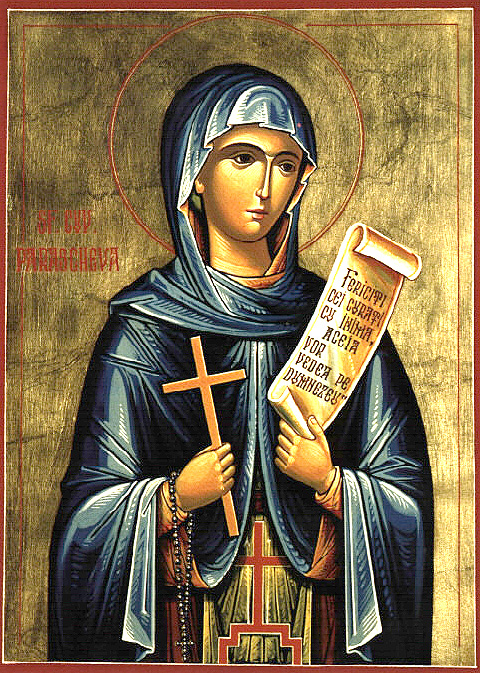 Saint Paraskeva the New was born into a pious family, living during the eleventh century in the village of Epivato, between Silistra and Constantinople. Her older brother Euthymius became a monk, and later he was consecrated as Bishop of Matidia. One day, while attending the divine services, the words of the Lord pierced her heart like an arrow, “If any man will come after Me, let him deny himself” (Mt. 16:24). From that time she began to distribute her clothing to the needy, for which reason she endured much grief from her family.
Saint Paraskeva the New was born into a pious family, living during the eleventh century in the village of Epivato, between Silistra and Constantinople. Her older brother Euthymius became a monk, and later he was consecrated as Bishop of Matidia. One day, while attending the divine services, the words of the Lord pierced her heart like an arrow, “If any man will come after Me, let him deny himself” (Mt. 16:24). From that time she began to distribute her clothing to the needy, for which reason she endured much grief from her family.
Upon the death of her parents, the saint was tonsured into monasticism at the age of fifteen. She withdrew to the Jordanian desert where she lived the ascetic life until she reached the age of twenty-five. An angel of the Lord ordered her to return to her homeland, so she stayed at Epivato for two years.
St Paraskeva departed to the Lord at the age of twenty-seven, and was buried near the sea. Because of the many miracles which took place at her grave, her relics were uncovered and found to be incorrupt. They were placed in the church of the Holy Apostles at Epivato, where they remained for about 175 years.
The Sunday of the Blind Day
5. June 2016 - 16:49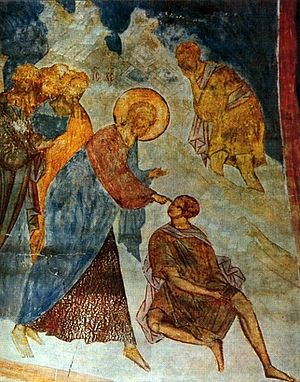 And as Jesus passed by, He saw a man who was blind from birth. And His disciples asked Him, saying, Master, who sinned, this man, or his parents, that he was born blind?
And as Jesus passed by, He saw a man who was blind from birth. And His disciples asked Him, saying, Master, who sinned, this man, or his parents, that he was born blind?
1. And as Jesus passed by, He saw a man who was blind from birth. Being full of love for us and caring for our salvation, and desiring to stop the mouths of the ungrateful, He overlooks nothing that is His to do, even if there’s no one to pay attention. The Prophet knew this when he said: That Thou might be justified in Thy words and prevail Thou art judged (Ps. 50). So here, too, when they wouldn’t accept the sublime meaning of His words, but said that He had a devil, and attempted to kill Him, He left the Temple and healed a blind man, placating their anger by His absence, and, through the miracle, softening their hardness and cruelty, making them believers in His words. And He performed a sign which was not adventitious, but one which took place then for the first time: Never since the world began has it been heard that someone opened the eyes of a person born blind. Someone may, perhaps, have opened the eyes of a blind person, but not of anyone blind from birth. And that He fully intended to do this when He left the Temple is clear from the following: it was He who saw the blind man, not the blind man who came to Him. And He looked at him so pointedly that His disciples noticed. And they came to question Him, because when they saw Him regarding the man so earnestly, they asked Him, “Who sinned, this man, or his parents?” Wrong question. How could he sin before he was born? And why, if his parents had sinned, would he have been punished? Why, then, did they put this question? Before, when He healed the paralytic, He said, “Look, you’ve been made well, sin no more.” Now they understood this to mean that he was paralyzed through sins and said, “Well, that man was paralyzed because of his sins; but what would you say about this one? Has he sinned? You can’t say that, since he’s been blind from birth. Did his parents sin? You can’t say that either, because a child doesn’t suffer punishment for its father.” Just as, when we see a child that’s been badly treated, we might say, “What can you say? What’s the child done?” It’s not so much a question as bafflement. The same is true of the disciples here: they weren’t asking for information, but rather they were perplexed. What then does Christ say?
Veneration of Emperor Constantine in Russia
4. June 2016 - 16:48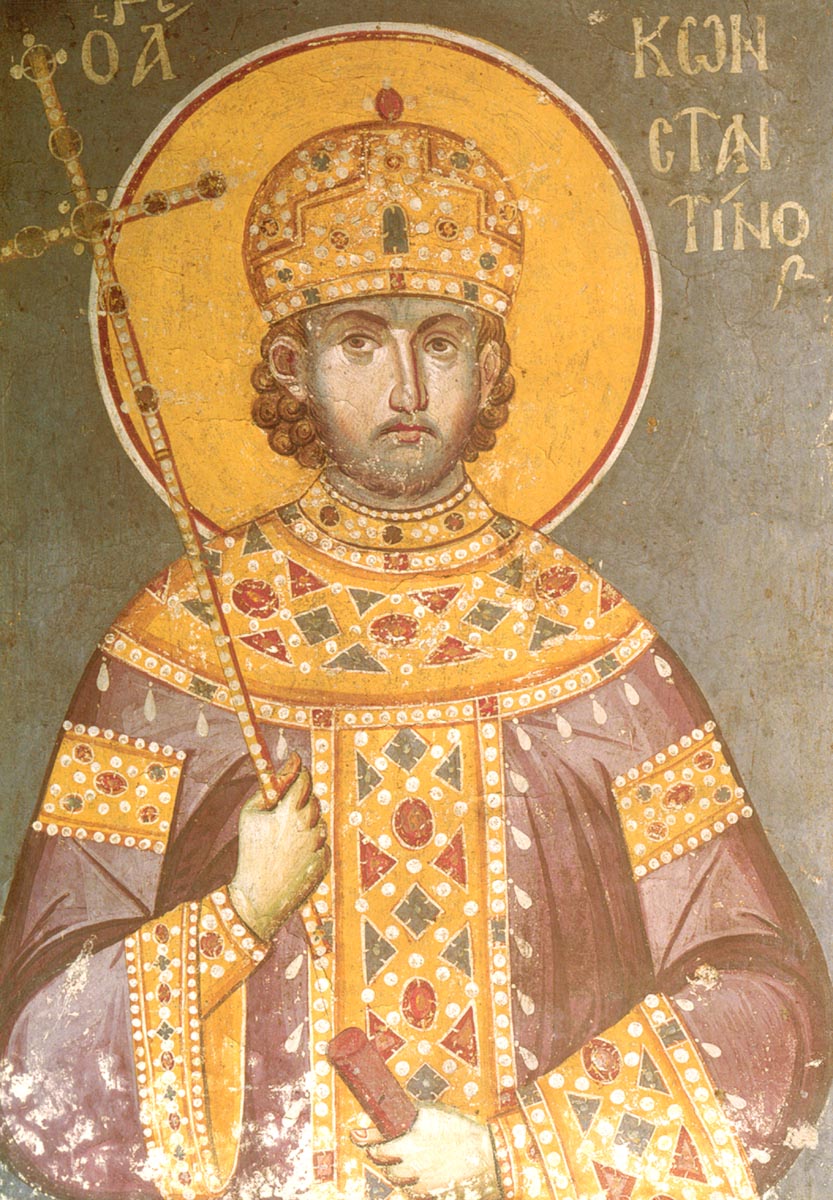 One of the acts most significant in its consequences for world history was the Edict of Milan, published 1700 years ago[1] by the Roman Emperor Constantine. A quarter century after its publication, in 337, Emperor Constantine fell seriously ill and died. According to Eusebius, not long before his death he “considered that it was time to cleanse himself of his former sins, for he believed that everything in which he sinned as a mortal will be taken from his soul by the power of the mystical prayers and saving word of Baptism.”[2] In order to receive the sacrament of Baptism Constantine went to the palace in Nicomedia, which was located near the new capital of the New Rome—Constantinople, where the Emperor Diocletian had earlier built his residence. To Nicomedia came the bishops of the outlying cities. Eusebius relates the words spoken by the Emperor to the bishops assembled around his bed: “The much desired and long-awaited time has arrived, for which I have prayed as the time for salvation in God. It is time for us to receive the seal of immortality, and to partake of saving grace. I had thought to do this in the waters of the Jordan, where as an example to us, as it is told, the Savior Himself received Baptism; but God, Who knows what is profitable, has vouchsafed this to me here. Thus, we shall no longer waver, for if it please the Lord of life and death to prolong my existence, if it has once been determined that I be henceforth united to the God’s people as a member of the Church, that I should participate in prayers together with everyone, then through this will I submit myself to these rules of life, according to God’s will.”[3]
One of the acts most significant in its consequences for world history was the Edict of Milan, published 1700 years ago[1] by the Roman Emperor Constantine. A quarter century after its publication, in 337, Emperor Constantine fell seriously ill and died. According to Eusebius, not long before his death he “considered that it was time to cleanse himself of his former sins, for he believed that everything in which he sinned as a mortal will be taken from his soul by the power of the mystical prayers and saving word of Baptism.”[2] In order to receive the sacrament of Baptism Constantine went to the palace in Nicomedia, which was located near the new capital of the New Rome—Constantinople, where the Emperor Diocletian had earlier built his residence. To Nicomedia came the bishops of the outlying cities. Eusebius relates the words spoken by the Emperor to the bishops assembled around his bed: “The much desired and long-awaited time has arrived, for which I have prayed as the time for salvation in God. It is time for us to receive the seal of immortality, and to partake of saving grace. I had thought to do this in the waters of the Jordan, where as an example to us, as it is told, the Savior Himself received Baptism; but God, Who knows what is profitable, has vouchsafed this to me here. Thus, we shall no longer waver, for if it please the Lord of life and death to prolong my existence, if it has once been determined that I be henceforth united to the God’s people as a member of the Church, that I should participate in prayers together with everyone, then through this will I submit myself to these rules of life, according to God’s will.”[3]

